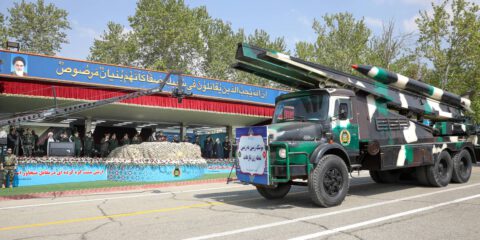Statements regarding the return of the Gaza Strip to PA control at present are not just disconnected from reality but pose a great danger that we will end up replicating the system that existed there up until October 7.
From the day it was established three decades ago and throughout all the years of its existence, the Palestinian Authority (PA) has been a corrupt and failed quasi-state. Not only has it failed to realize its historic national goal as a platform for the full implementation of Palestinian independence and the establishment of a sustainable state “with Jerusalem as its capital,” but over the years the PA has lost its hold on the Palestinian public along with its support and has failed the test of controlling its destiny.
The roots of the PA’s failure lie in its early years. Instead of fighting Palestinian terrorism as required by the Oslo Accords, PA President Yasser Arafat chose not to confront Hamas and the other Palestinian terror organizations. As long as they did not threaten his rule, Arafat and the PA perceived Hamas and the other terrorist organizations as a means of pressuring Israel to make further concessions. Arafat signaled from the beginning that he was not devoted to peace. One particularly significant event in this respect was a speech Arafat’ gave in Johannesburg in May 1994 in which he compared the Oslo Accords to the Treaty of Hudaybiyyah (a treaty with a rival tribe that Muhammad violated when he conquered Mecca). Despite the Oslo Accords, Arafat continued to incite against Israel and to entrench the narrative that peace with the Jewish state was not desirable.
Whenever Israel did not agree to Arafat’s demands at the negotiating table, he opted to use violence: In September 1996 he instigated the Western Wall Tunnel riots; continued with the Nakba Day events in May 2000; and peaked in September 2000 with the outbreak of the Second Intifada following the failure of the Camp David Summit (peace talks between Arafat and Israeli prime minister Ehud Barak, mediated by United States president Bill Clinton). The Second Intifada erupted even though prior to its outbreak the economic situation of the Palestinians was excellent; this contradicted the Western perception that the Palestinians would not turn to violence if they had something to lose. This Western misperception, which attributes significant importance to economic factors, has led to a chronic misunderstanding of Middle Eastern culture and values.
Even after the end of the Arafat era in late 2004, the PA was unable to change its course and kept on marching the Palestinian people towards the realization of their national goal of freeing Palestine “from the river to the sea” through violence. One exception was Salam Fayyad’s years as PA prime minister (June 2007-June 2013); he acted contrary to the pattern of action of Arafat’s successor as PA president, Mahmoud Abbas, and was therefore removed from his position. Abbas understood that endorsing the armed struggle was harmful to the national goals of the Palestinians, and therefore spoke out officially against the use of terrorism. Yet at the same time, he continued to incite against Israel on every stage, including school curricula, and continued to glorify terrorists and pay salaries and benefits to Palestinians sitting in Israeli prisons for terrorism offenses, and to their families.
The main failure of Abbas and the PA was twofold. First, Abbas’s refusal to respond to Israeli prime minister Ehud Olmert’s proposals in 2008 and US Secretary of State John Kerry’s outline in 2014 clearly illustrated that the PA is unable and unwilling to reach a historic compromise with Israel and a peace agreement with the Jewish state. Second, the fall of the Gaza Strip to Hamas in June 2007 and the gradual loss of governance in the West Bank (which without Israel would certainly have turned into “Hamastan 2”) proved that the PA is incapable of governing the Palestinian people and serving as a real alternative to Hamas.
Moreover, the PA has lost its legitimacy among the Palestinian public, which in recent years has radicalized its position towards Israel. The Palestinians no longer perceive the PA as a body that represents them. Rather, they view it as a corrupt entity that has become a burden on the Palestinian people and accuse it of collaborating with Israel and thus anchoring the reality of the occupation. According to a Palestinian Center for Policy and Survey Research (PCPSR) poll at the end of September, most of the Palestinian public supports the dissolution of the PA (52%), while 62% view it as a burden. The poll also shows that 76% of the Palestinian public is not satisfied with Mahmoud Abbas’ performance and that were elections to be held, he would be defeated by the Hamas candidate, Ismail Haniyeh (58% vs 37%).
The PA has succeeded in one thing, and it has done so with distinction: It consistently incites against Israel and over the course of three decades has persistently shaped the psychological infrastructure of Palestinian society, which is based on the cultivation of hatred towards Israel and the Jews. Moreover, it has cultivated an ethos of armed resistance, of glorification of terrorists, and of the right of return and the denial of the right to a Jewish nation-state within any borders in the region.
Yet despite the bitter historical experience with the PA, the loss of its public legitimacy, and evidence that it is losing its governance in the West Bank territories, there are still voices, both in Israel and in the United States, who expect that, after the fall of Hamas, the keys to the Gaza Strip should be given to Abbas and his loyalists. While Israel is not interested in controlling the 2.2 million Palestinians in Gaza and accepting responsibility for managing their day-to-day lives, the Biden administration hopes that the return of Abbas and the PA to the Strip will restore calm to the region and perhaps create an opening for the renewal of the peace process with Israel. Thus, it seems that elements in Washington and Jerusalem are simply “addicted” to the PA, an addiction that stems from blindness to history and contemporary reality. Even if the PA were to return to Gaza, it would not be long before it once again lost its rule to Hamas or another Islamist organization, or started another intifada against Israel after the latter did not agree to concessions that would endanger its security.
In conclusion, the main lesson Jewish society in Israel should have drawn from the Second Intifada is that despite the desire to reach peace with the Palestinians, there is no chance in the foreseeable future to bridge the gaps between the parties and overcome the deep crisis of mutual trust. In this context, it seems that the main lesson for Israeli Jews following the murderous massacre carried out by Hamas is that Israel must not allow the Palestinians or any other external party to accept responsibility for territory near Israel’s border. The horrors of Hamas’ October 7 carnage and the terror campaign that has been ongoing in the West Bank territories since March 2022 have extinguished among most Israelis the hope of living in peace alongside the Palestinians.
Therefore, the day after the overthrow of Hamas rule in the Gaza Strip, Israel must ensure that it and no one else is responsible for security in the area. We must not fall into illusions that the PA is part of the solution in Gaza, and we must think of other alternatives for the future of the Strip. Apart from a security zone in which particularly strict rules of movement will be enforced along with absolute Israel military freedom of operation throughout Gaza – as currently exists in the West Bank – Israel must finally complete the process of disengagement from the Gaza Strip and ensure that the border with it is hermetically sealed. Israel cannot and must not be the address for Gaza’s future economic and civil needs. Separation from the Palestinians in Gaza must be airtight.
The PA may one day be able to return to the Gaza Strip after the appropriate conditions are met, but it cannot be the same entity with which we are familiar. It must go through a process of dismantling and reassembling, and its psychological infrastructure must be reshaped and its incitement and murderous hatred against Israel and the Jewish People rooted out. The new PA should be built with responsibility and professionalism and through a strict and continuous mentoring process by the international community. Only then will it be possible to consider the PA returning to the Gaza Strip.
Statements regarding the return of the Gaza Strip to PA control at present are not just disconnected from reality but pose a great danger that we will end up replicating the system that existed there up until October 7. The international community must sober up and free itself from the chains of its devotion to the PA, which blind it and prevents it from understanding the magnitude of the change required. The Palestinian people deserve something better; Israel, the region, and the world deserve a Palestinian governing body that is more responsible and functional. The future of the Gaza Strip, like that of the Palestinian entity as a whole, lies in integration into a new regional architecture, based on the normalization processes between Israel and the pragmatic Sunni Arab world led by Saudi Arabia. This will lead to greater opportunities and Palestinian development will become possible behind a protective wall against Hamas barbarism under the auspices of the axis of evil led by Iran. The PA at present is immature and unable to meet the necessary challenges, and hence we must not stumble blindly.
JISS Policy Papers are published through the generosity of the Greg Rosshandler Family.
Photo: IMAGO / ZUMA Wire / Chuck Kennedy / State Department








 - בניית אתרים
- בניית אתרים